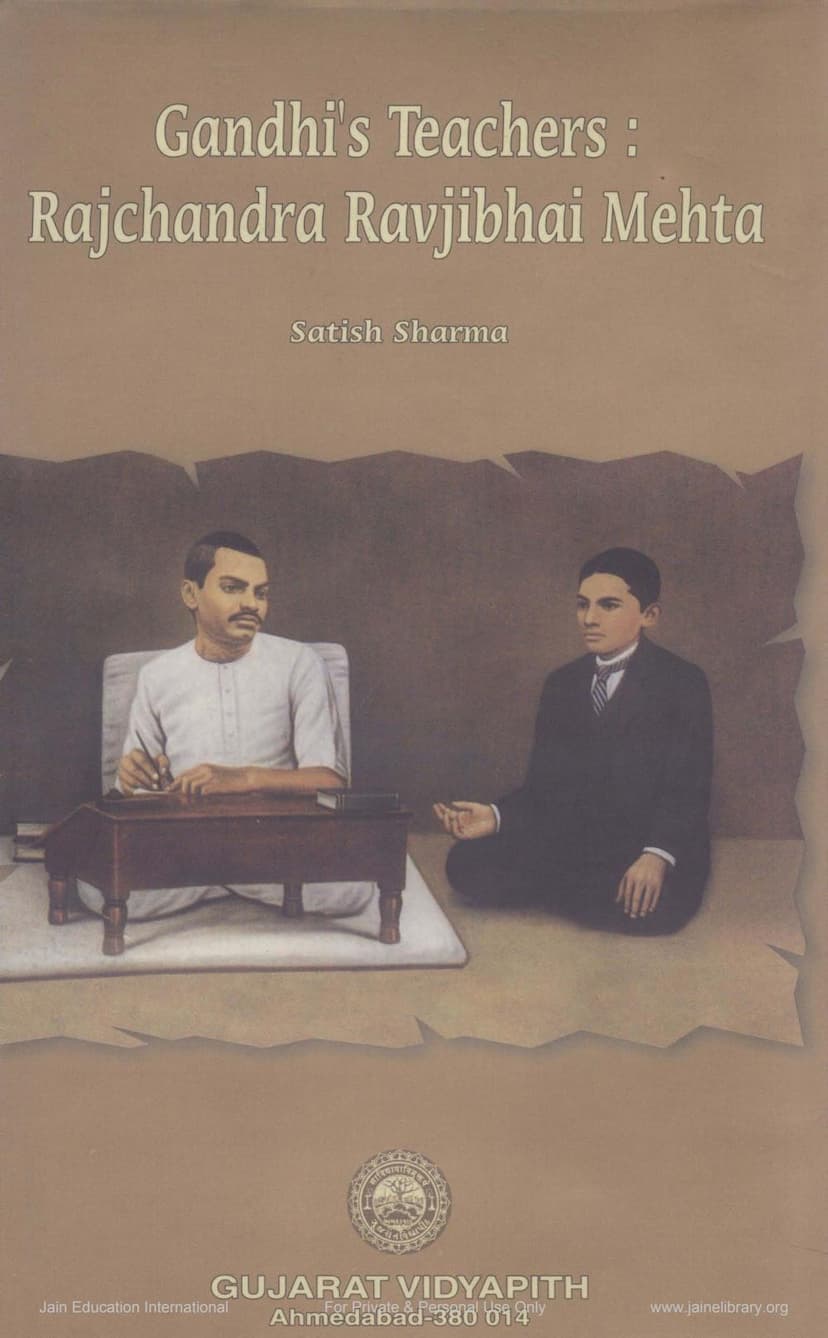Gandhis Teachers Rajchandra Ravjibhai Mehta
Added to library: September 1, 2025

Summary
Here is a comprehensive summary of the book "Gandhi's Teachers: Rajchandra Ravjibhai Mehta" by Satish Sharma, based on the provided text:
Overview:
"Gandhi's Teachers: Rajchandra Ravjibhai Mehta" by Satish Sharma, published by Gujarat Vidyapith, Ahmedabad, is a work that delves into the profound influence of the Jain saint-philosopher Rev. Rajchandra Ravjibhai Mehta on Mahatma Gandhi. The book aims to bring to light the life, philosophy, and teachings of Rajchandra, whom Gandhi acknowledged as one of his foremost gurus. Despite Gandhi's high regard for Rajchandra, the author notes that much of Rajchandra's life and thought remain relatively unknown. The book seeks to bridge this gap, offering valuable insights for both scholars and beginners in Jain philosophy and Gandhian thought.
Key Themes and Content:
The book is structured to provide a comprehensive understanding of Rajchandra and his impact on Gandhi. Its chapters cover:
- Rajchandra's Life: A biographical sketch detailing his birth, upbringing, spiritual journey, and personal conduct.
- Gandhi's Questions from South Africa and Rajchandra's Answers: This section highlights the significant correspondence between Gandhi and Rajchandra, particularly addressing Gandhi's spiritual and religious dilemmas. Rajchandra's responses, deeply rooted in Jain philosophy, helped Gandhi navigate his doubts about Hinduism and other religions.
- Rajchandra's Influences on Gandhi: The book details how Rajchandra significantly shaped Gandhi's life, thought, reform endeavors, and his pursuit of self-realization and moksha. Key influences discussed include Gandhi's vow of brahmacharya (celibacy/continence), dietetic experiments, commitment to simplicity, religious equanimity, aparigraha (non-possession), compassion, and understanding of dharma.
- Jainism and the Jain Goal of Life: A dedicated chapter explains the core tenets of Jainism, including ahimsa (non-violence), the concept of tirthankaras, the Jain path to liberation (moksha or kevalya), the five great vows, and the philosophy of saptabhangi and anekantvada. This contextualization is crucial for understanding Rajchandra's Jain perspective.
- Rajchandra's Philosophy of Six Padas: This chapter explores a significant aspect of Rajchandra's teachings, presenting six spiritual steps that lead to right perception and, ultimately, liberation. These steps address the existence, eternality, role as doer and enjoyer, the possibility of liberation, and the way to achieve it.
- Rajchandra's Work: Atma-Siddhi (Self-Realization): The book includes and analyzes Rajchandra's poetic and philosophical treatise, Atma-Siddhi. This work, composed in Gujarati verse, elaborates on the journey of self-realization, the obstacles to it, the necessity of a true teacher, and the path to liberation, drawing heavily from Jain principles.
Gandhi's Perspective on Rajchandra:
Gandhi held Rajchandra in exceptionally high esteem, referring to him as "Raychandbhai" or "Raichandbhai" and "the Poet." He acknowledged Rajchandra's profound influence on his life, stating: "On my life there is such a constant influence of Rajchandra that I can not describe. I have very deep feelings from him. For years, I have been in search of highly religious people. So far, I have not found another person who could equal him." Gandhi was particularly impressed by Rajchandra's intellectual faculties, sincerity, simplicity, spiritual orientation, and his ability to reconcile worldly business with spiritual pursuits. Rajchandra's advice was instrumental in resolving Gandhi's spiritual crises, particularly during his stay in South Africa when faced with pressure to convert to Christianity or Islam. Rajchandra's concluding remark in his response to Gandhi's query about Hinduism, "On a dispassionate view of the question, I am convinced that no other religion has the subtle and profound thought of Hinduism, its vision of the soul, or its charity," deeply resonated with Gandhi, reaffirming his commitment to Hinduism.
The Book's Significance:
The author, Satish Sharma, highlights that while Gandhi's other influences like Tolstoy and Ruskin are widely known, Rajchandra's impact, despite being considered paramount by Gandhi himself, remains less recognized. This book serves as a pioneer work in illuminating Rajchandra's contribution to Gandhian thought. The author emphasizes the need to include readings on Rajchandra's life and thought in studies of Gandhi, social welfare, social justice, and nonviolent cultures. The book is considered a valuable resource for undergraduate and graduate studies across various disciplines, offering both inspiration and practical guidance.
Publication Details:
- Author: Satish Sharma
- Publisher: Gujarat Vidyapith, Ahmedabad
- First Edition: February 2005
- Copies: 500
- ISBN: 81-86445-79-X
In essence, "Gandhi's Teachers: Rajchandra Ravjibhai Mehta" by Satish Sharma is a scholarly and accessible exploration of a vital, yet often overlooked, spiritual and intellectual relationship that significantly shaped Mahatma Gandhi's life and philosophy. It underscores the importance of Jain teachings, particularly through the exemplary life and profound wisdom of Rajchandra, in forming the foundations of Gandhian thought and practice.